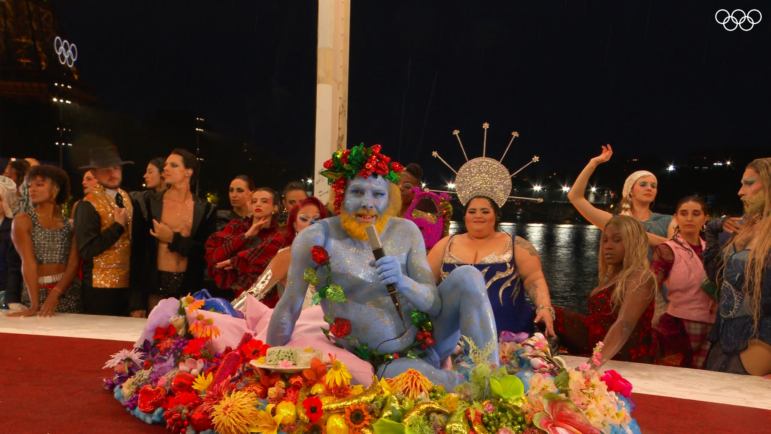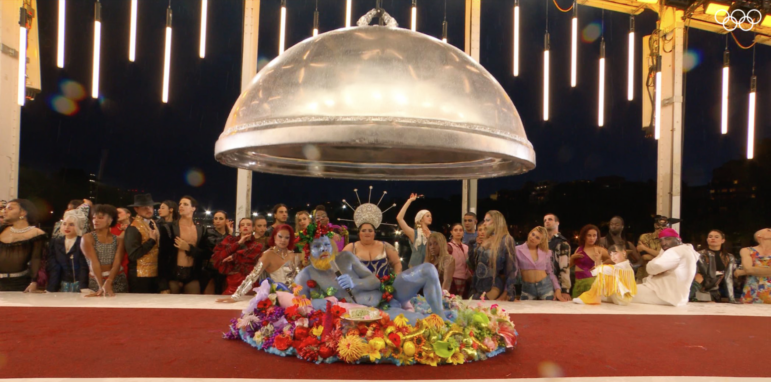by Elyse Welles (author and Priestess native to Greece) and Manny Moreno
PARIS – In case anyone missed it, Friday’s vibrant if not wild opening ceremony for the 2024 Paris Olympics highlighted everything from athletes to art. Even French metal bands were included and the ceremonies were topped off with the triumphant return by Celine Dion.
The opening was full of classical and pop references. For instance, centuries-old Parisian monuments served as the backdrop for a film featuring a faceless Olympic flame-bearer, a nod to the video game Assassin’s Creed.
One now particularly famous scene from the opening ceremonies featured a scantily clad man painted in blue emerging from the center of a table to sing with dancing drag queens.

Philippe Katerine as Dionysus/Bacchus. Courtesy Olympic Games
It was too much for Christians, who have joined a parade of outrage because, to their eyes, the scene resembles Leonardo Da Vinci’s Last Supper painting. Conservative and Christian leaders were quick to condemn the scene as an offensive parody of Jesus’ Last Supper, where on the evening before his crucifixion, he instigated the Eucharist, predicted his betrayal, and washed the feet of his disciples to demonstrate humility. The event holds deep spiritual and liturgical significance in Christianity, especially on Maundy Thursday during Holy Week and Easter celebrations.
The French Bishops’ Conference, which represents France’s Catholic bishops, described the scene as a “mockery and derision of Christianity.” In a statement on X, they added “we are thinking of all the Christians on every continent who have been hurt by the outrageous provocation of certain scenes.
Influential American Catholic, Bishop Robert Barron of Minnesota, posted a response to the Olympics opening ceremony on YouTube saying the scene was a “gross mockery” of “a very central moment in Christianity.” He then posed a question, “Would they ever have dared mock Islam in a similar way?”
All the Christian pearl-clutching in outrage, however, overlooked a simple thing: It wasn’t a portrayal of the Last Supper.
Rather, the performance was a nod to the feast of Dionysus, the Greek god of fertility, wine, and revelry. Pagans who watched the performance were clear about the portrayal. Even the official Olympics account on X stated on Friday that the “interpretation of the Greek God Dionysus makes us aware of the absurdity of violence between human beings.”
Considered a national treasure in France, singer and actor Philippe Katerine portrayed Dionysus – identified to Romans as Bacchus – has a special connection to France: He is reportedly the father of Sequana, the Gallo-Roman Goddess of the River Seine.
There was no mention of the Last Supper anywhere until Christians saw something that wasn’t there.

The full scene with Philippe Katerine as Dionysus/Bacchus and the drag queens and dancers. Courtesy Olympic Games
Most Pagans and definitely Hellenic Pagans & polytheists saw the ceremony for what it was and caught all the allusions and imagery present. While Christians have been shocked by drag queens and a blue man, our community has been discussing Bacchus/ Dionysus.
In the popular, international Facebook group, Hellenic Pagan, a recent discussion begun by Lydia Trost discussed Hellenic erasure in the conversation around the opening ceremony. “[Christians] saw what they thought was something that would have nothing to do with the Olympics and completely ruled out that it might have something to do with Ancient Greece. Now I know the erasure of Hellenism was great, but you’d think that they’d even think about history at the very least. I fear that paganism is beginning to be erased and I didn’t see anyone else comment on that fact. They took OUR religion and made the oppression about them.”
When it came to the performance itself, Trost explained that she thought “it was a tribute and I thought it was quite a fun scene.” Manuel Weihrauch added to the conversation with a positive approach. “I don‘t know where the problem is! I think the Gods themselves have humour! It was an amazing show and in no way was it intended to be a mockery. I think what is being acted out in the reactions – even among pagans – is the Christian conditioning. I see an archaic revival – still superficially but it will gradually deepen! .”
This was echoed by Eric Paul who shared: “I thought it was great. Dionysus has always been about controversy and this depiction of him is as true to him as any other. The Bacchanal was awesome too.”
But he did comment on Hellenic erasure in the mainstream conversation, as well. “Of course, the Christians make it all about them. They have been the center of American life since it began. I’m glad many of them are being forced to learn of these ancient Greek customs.”
Not everyone was thrilled about the imagery. Many Pagans understood the origin of the images, but there were still some concerns. Christina Moraiti, a Torchbearer and Keybearer of the Covenant of Hekate and the founder of The Sanctuary of Hekate Trioditis and Following Her Torches, a decade-long project cataloging a map of modern and ancient temples, statues, and sanctuaries for Hekate around the world, had a different perspective on the Bacchanalian ceremony. “As a polytheist and a Greek person, I felt shame for what I was seeing. That caricature Smurf is not the God Dionysus. The fact that the torchbearer lit the fireworks for the gig of that French pop star with the Olympic flame, which for Greeks is considered sacred, was also awful. The Olympics are about high ideals, not to mock or insult anyone about their religion, ethnicity, or race.”
Christos Pandion Panopoulos, a founder of Labrys Hellenic Worship COmmunity, a native Hellenic polytheist group in Greece, echoed Moraiti’s sentiments. “Even depicting Dionysus and having another painting (of the marriage of Thetis and Peleus) as an inspiration, and taking into account their [the Olympic Games Committee’s] official explanation, still it is out of place, out of context, and nothing to do with the original Greek concepts (apart from the cult of Dionysus – and polytheism in general I would say – being inclusive) in relation to either real Ολυμπιακοί αγώνες, or Olympic Games.”
Some also saw it as an opportunity for advocacy: maybe it is time for devotees of the Old Gods, Greek or otherwise, to demand better representation. They noted that our gods are alive, real, and our religions and spiritual practices are, too. And yet Pagans are never asked for comments about the way Christians or Muslims would be in a parallel situation where their gods or religious figures are depicted; we are never considered like a Christian would be. We are always expected to take the high road and just accept any representation as positive. But maybe it is time to change the tides. “Hellenic polytheists and Pagans deserve the same seat at the table of other religions, especially in regards to our gods being represented in the global arena,” said Elyse Welles, as a Greek witch and Priestess living in Greece.
Markos Gage, an administrator of the Hellenic Pagan Facebook group, said it best: “People are always going to be hurt and angry at something, especially if it’s confronting. Dionysos by his nature is confronting. A takeaway from this whole thing is I have never seen so many people talking about Dionysos, not just on social media but in mainstream media. That’s an incredible performance in my opinion.”
The Wild Hunt is not responsible for links to external content.
To join a conversation on this post:
Visit our The Wild Hunt subreddit! Point your favorite browser to https://www.reddit.com/r/The_Wild_Hunt_News/, then click “JOIN”. Make sure to click the bell, too, to be notified of new articles posted to our subreddit.
